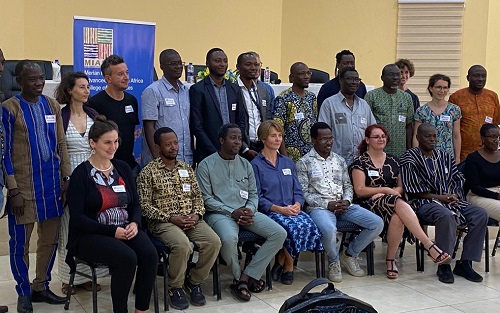
MIASA holds midterm conference on sustainable governance
The Merian Institute for Advanced Studies in Africa (MIASA) in collaboration with the University of Ghana has held its Midterm Conference with focus on sustainable governance.
Advertisement
The three-day conference, which started on September 19-21, 2023, was on the theme: “Sustainable Governance in a Time of Global Flux: Issues, Concepts and Future Directions.”
The event brought together about 100 scholars and researchers from across the globe to deliberate on the thematic research areas of MIASA.
The Midterm conference hosted a total of six panels and three roundtables with keynote addresses from Professor Elisio Macamo from the University of Basel and member of MIASA’s Academic Avisory Board as well as Professor Dzodzi Tsikata from SOAS, University of London, formerly Director at Institute of African Studies at the University of Ghana, and co-initiator of MIASA, founding director and former chair of MIASA’s Executive Council.
Among the topics treated and discussed at the event included “Sustainable peacebuilding? Historical trajectories and global interconnections”; “Formal institutions, informality and knowledge production: Developing a research agenda for the analysis of institutional variations in Africa”; “Strengthening Governance Institutions for Accountability and Service Delivery in Africa”; “Interreligious relations in Africa – How to avoid conflict and promote peace”; “Seeking Support Through Religious Networks: Responses to Terrorist Attacks in Africa”; and “Extractive governance across time and space: what does ‘sustainability’ mean in contexts of mineral, oil, or gas production?”
The MIASA is an institute under the College of Humanities, University of Ghana. It is based on a collaboration between the University of Ghana and four German partners: the University of Freiburg (leading house), the Goethe University Frankfurt, the German Institute for Global and Area Studies (GIGA), and the German Historical Institute Paris (GHIP).
MIASA, which serves as a platform for German-African research collaboration in the social sciences and humanities aims at making African thinking increasingly relevant in academic debates.
The Institute is jointly sponsored by the German Federal Ministry of Education and Research (BMBF) and the University of Ghana.
MIASA's research programme explores the issue of sustainable governance in an interdisciplinary perspective, focusing on three thematic area: democratic governance; peace and conflict, and sustainable transformations.
Moreover, MIASA is interested in issues that are at the intersection of these areas and that allow for anchoring its research in concrete experiences and historical contexts: migration; landownership and acquisition; restitution of colonially taken African objects; African cities; and human rights.
Speaking at the opening of the conference, the two MIASA Directors, Dr. Grace Diabah and Dr. Susann Baller, noted that since the start of its fellowship programme in 2019, MIASA had hosted more than 100 fellows at its premises.
Dr Ballaer said the midterm conference, which marks the middle of MIASA’s six year “main phase” of German government funding, was meant to bring together different MIASA fellow generations and MIASA’s partners as well as other researchers from across the globe to reflect on MIASA’s overarching topic of sustainable governance.
According to the MIASA Directors, the conference would enable participants to explore the interconnections and interconnectedness between MIASA’s thematic areas.
For them, the conference addresses the question of which role governance plays for them and which forms, practices and expressions governance takes, as well as question, rethink and reinvent concepts, methods and epistemologies of sustainability and sustainable governance.
The conference also reflected on the recent transformations and disruptions across the world as a result of the COVID-19 pandemic and Russia’s invasion of Ukraine with its attendants debates about the governance of economies and growing inequalities across some economies.
In her welcome remarks, Dr. Christina Norwig of the German Federal Ministry of Education and Research (BMBF)) noted that challenges such climate change or peace building do not stop at national borders but that such societal challenges had to be carried out internationally.
She said MIASA had created opportunities for researchers from across the globe to meet and deliberate on key issues that affect the development of the world, particularly Africa.




